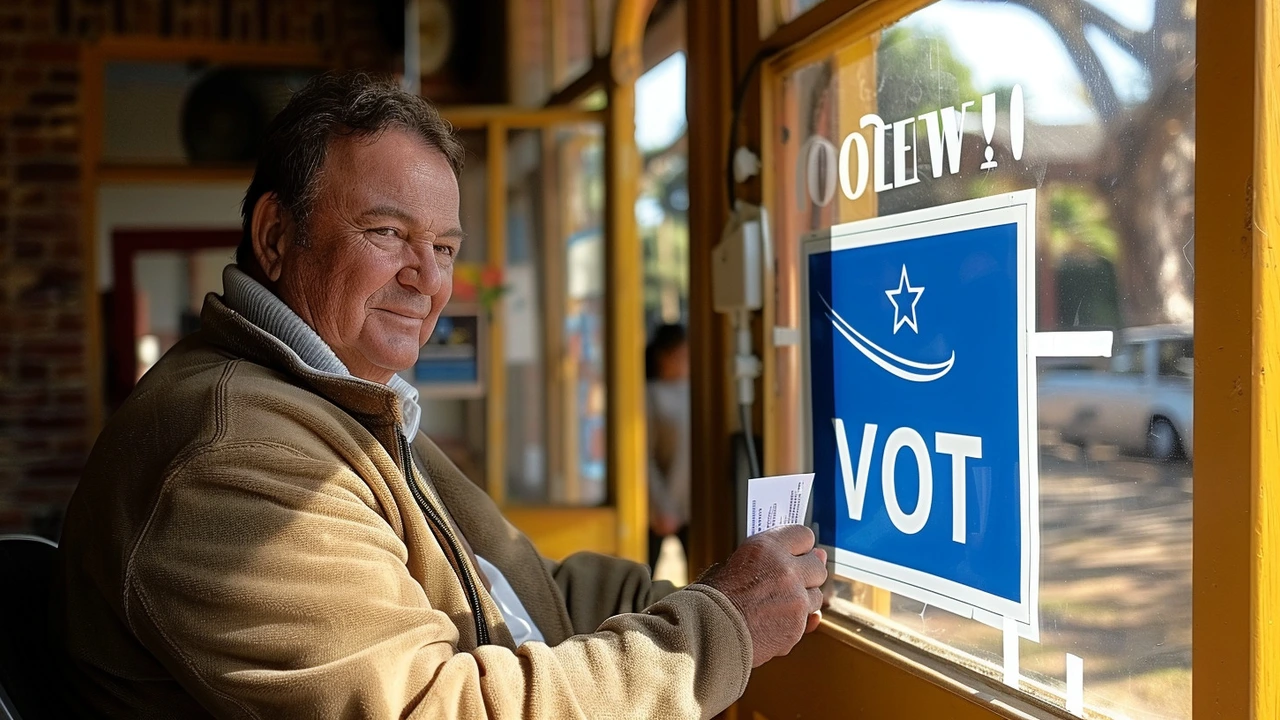Senior Citizen Feels Gratified Casting His Special Vote in Pretoria

In Politics
Senior Citizen Joyful After Casting His Special Vote in Pretoria
Caiphus Rampe, a spirited pensioner from Orchards ext 21 in Arcasia, Pretoria North, shared his thrilling experience of casting his special vote, doing so on the last day dedicated to special voting. The elderly gentleman chose to utilize the special voting option, citing his desire to sidestep the long queues which he anticipated might be strenuous given his age. For him, the convenience of voting early embodied a meaningful cause, one that could ensure a better life for the younger generations and foster unity among South Africans.
The Essence of Voting for the Elderly
Rampe's excitement underscores a significant reality – the elderly often face challenges that make standing in long lines on Election Day particularly daunting. By casting his vote early, he not only embraced his civic duty but also highlighted the importance of making accommodations for senior citizens. He emphasized that every vote is an opportunity to voice one’s concerns and aspirations for the future, stressing that voting is more than a right; it’s a path to shaping the nation’s trajectory.
Reflecting on his decision, Rampe stated, “Voting is not just about the present; it’s about ensuring that our children and grandchildren inherit a country we can all be proud of. We must do our part to nurture and sustain the values that promote unity and service to the community.” His sentiments paint a broader picture of the intrinsic value of participation in the democratic process, regardless of age.
A Sense of Community and Responsibility
Someone who echoed Rampe’s sentiments was Ditaelo Ranwedi, another resident of Orchards. Ranwedi spoke passionately about the power and significance of voting as a means of expressing one’s voice. She noted, “When we cast our votes, we are not just participating in a procedural activity; we are contributing to the service delivery that impacts our daily lives. Every vote helps shape our communities and the country at large.”
Ranwedi's perspective illustrates the communal and responsible nature of voting. She emphasized that it's an opportunity not just to influence policy but to directly contribute to the welfare of one’s own surroundings. This notion of civic engagement being a collective effort displays the interconnectedness of community actions and the overarching governance of a nation.
Insights from Wonderpark Voting Station
At the Wonderpark voting station, there was a significant turnout for special votes. Approximately 140 special votes were registered at the station, showcasing a diverse demographic, though notably, many were younger individuals. These young voters pointed out that work commitments and other engagements on the main election day had driven them to vote early. Their proactive approach similar to the older voters highlights how special voting accommodates various segments of the population.
The arrangement for special votes serves multiple purposes. Primarily, it ensures that those who might face hurdles on the official voting day, whether they be due to age, health, or prior commitments, still have a chance to participate in the democratic process. Beyond convenience, it symbolizes inclusivity within the electoral system, affirming that every citizen’s voice matters.
Electoral Commission’s Role and Statistics
Providing a broader view, the Electoral Commission shed light on the overall figures. They reported an estimated 201,794 voting station visits for special votes on the first day alone, spread across 22,626 service points. Furthermore, the Commission has outlined an extensive plan to visit a total of 624,593 voters, supported by 62,000 officials. These officials are often accompanied by political party agents and observers, ensuring the transparency and integrity of the voting process.
Such figures not only highlight the scale and logistical coordination behind the special voting system but also reflect the Commission's commitment to facilitating and safeguarding the voting rights of every eligible citizen. The meticulous planning involved, with officials traveling to various locations, signifies a proactive approach to accommodate all voters regardless of their circumstances on the main election day.
Challenges and Opportunities
Despite the robust system in place, the special voting process is not without its challenges. Coordinating thousands of officials and ensuring that votes are cast and recorded accurately requires immense effort and precision. Potential hurdles such as accessibility to remote areas, ensuring that all eligible voters are informed, and managing the logistical demands are constant considerations for the Commission. However, the effort is undoubtedly worthwhile, considering the increased voter turnout and the reinforcing of democratic values it entails.
Moreover, the approach towards special votes opens opportunities for further innovations in the electoral process. Exploring additional methods such as mobile voting stations, increased digital facilitation, and extended voting periods for special votes are avenues that could be considered to enhance participation. Ensuring that the electoral system evolves to meet the changing needs of its electorate is crucial for sustained engagement and trust in the process.
Conclusion: A Unified Effort
The narrative of Caiphus Rampe and Ditaelo Ranwedi sheds light on the personal and communal significance of voting in South Africa. Their experiences underscore that despite age or circumstance, the act of voting is a collective endeavor that empowers individuals and communities alike. As the Electoral Commission continues to streamline and improve the voting process, the spirit of democracy is manifest in the enthusiastic participation of its citizens.
From addressing the needs of the elderly to accommodating the busy schedules of the younger generation, special votes symbolize an inclusive and adaptive democratic system. They ensure that every voice, irrespective of the challenges faced, is heard and counted. This inclusive approach forms the bedrock of a resilient democracy, fostering a sense of unity and shared responsibility among all South Africans.
As we look forward, it is essential to continue advocating for and implementing measures that facilitate broader participation in the democratic process. By doing so, we not only honor our civic duties but also enrich the very fabric of our society, paving the way for a more unified and prosperous future for all.
Write a comment